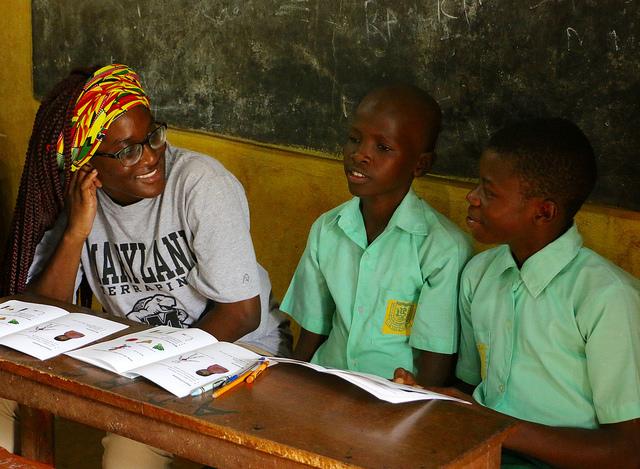
A group of six University of Maryland students, accompanied by Behavioral and Community Health Research Professor Dina Borzekowski and UMD affiliate and master educator Tina Lipscomb, traveled to Sierra Leone in June to continue the work that the UMD Public Health Without Borders group began back in 2014. The ten-day trip was the fourth visit of UMD students to Calaba Town, a community on the Western coast near the country’s capital of Freetown.
The student team’s main goal for this trip was to strengthen the partnership and relationship with the town’s Abigail D. Butcher School, a primary school founded by UMD alumnus and retired NFL player Madieu Williams, B.S. ’03, back in 2009. The students aimed to immerse themselves in the Sierra Leonean culture and teach local students and parents about chronic diseases, water sanitation, nutrition and the Ebola outbreak. On their first day in Calaba Town, the students were introduced to over 200 children in kindergarten through the sixth grade by the school’s Principal Koroma and Vice-Principal Tholley.
“We wanted to spend time getting to know the kids and to build their trust in us,” said Kelsie Challenger, a behavioral and community health major who is entering her sophomore year this fall. “They made us feel like we are heroes coming to help them, but we wanted to empower them and for them to see us as friends and partners.”
In the following days, the PHWB students toured the area and talked to many community members, receiving tremendous insight into the day-to-day life of a Sierra Leonean. To do this, the team visited markets, a health clinic, the offices of Partners in Health, a chimpanzee reserve, historic Freetown sites, two beaches, and even attended a church service upon the invitation of the community leaders.
The students led interactive health workshops, focused on topics including nutrition, chronic disease, and water sanitation. They created fun age-appropriate activities, where children not only learned information but also had the opportunity to teach lessons to their classmates. The fun included UMD students teaching school children and the community “Chocobodi,” a current dance, which is a mix of several popular African dances. “We played the song like 10 times a day! The kids loved it and wanted to do it again and again,” Kelsie said. “It was a lot of fun, but I have to admit I don’t want to hear it again for a while!”
The PHWB team identified goals for future action based on what they heard about the community issues around access to health care. Sitting side-by-side, the UMD team and community members discussed strategies and plans to reach tangible and sustainable solutions, including collecting data on disease incidence, prevalence, morbidity, and mortality and determining viable federal agencies and NGOs who could assist in funding and building a community-based health clinic.
“Going to Sierra Leone has changed my perspective about a service trip. Before I thought we had more to give to them, but I learned so much from them,” Kelsie reflected. “It is just a beautiful country and while they have been through a lot, they are so full of life. The culture is just beautiful. Also, we have so many things we take for granted [as Americans]. Being able to turn on the tap and have clean water come out is a big deal. It has made me be more aware and mindful of these things.”
Team members included:
Kelsie Challenger, Ugochi Chinemere, Garrett Doyle, Nicole Haggerty, James Kavanagh, Maddy Pekosz and Tina Lipscomb
Building Empathy Across Borders through Virtual Global Pen Pals
In addition to the student-led activities with the school children, Dr. Borzekowski, who serves as the interim director of the School of Public Health’s new Global Health Initiative (as of July 1, 2018), was also keeping the kids busy. Dr. Borzekowski, an expert on the influence of media on child health, interviewed Sierra Leonean children on camera for a project aimed at building bridges between children in countries all over the world.
With Howard Blumenthal, American television and new media producer, Dr. Borzekowski is producing short videos with kids from countries including Uganda, Hong Kong, England, India, Ukraine, Sri Lanka, Afghanistan, Mexico and the United States. Video shorts feature preadolescents discussing issues around girls’ education, environmental issues, and risky behaviors. The goal is to deliver these videos through easily accessible social media and mobile platforms.
“When children view videos of children around the world, how does that change their perceptions of the ‘other?,” she asks.
Borzekowski continued “We’re hoping that kids not only see the similarities in the challenges that others face but also see strengths of others to tackle difficult challenges. We hope to build bridges across borders. This project is based on the old concept of pen pals – but takes it to a new level, crossing time zones and cultures, using new technology.”
Dr. Borzekowski is optimistic that this international project will stimulate a new generation of digital pen pals and encourage understanding and empathy across borders.
She and Blumenthal are currently pursuing funding opportunities for the ambitious global effort.
Article Link: